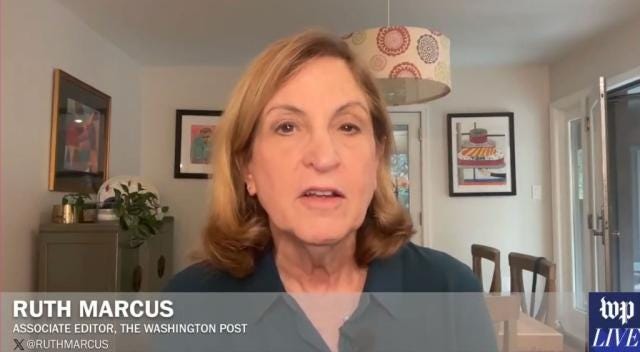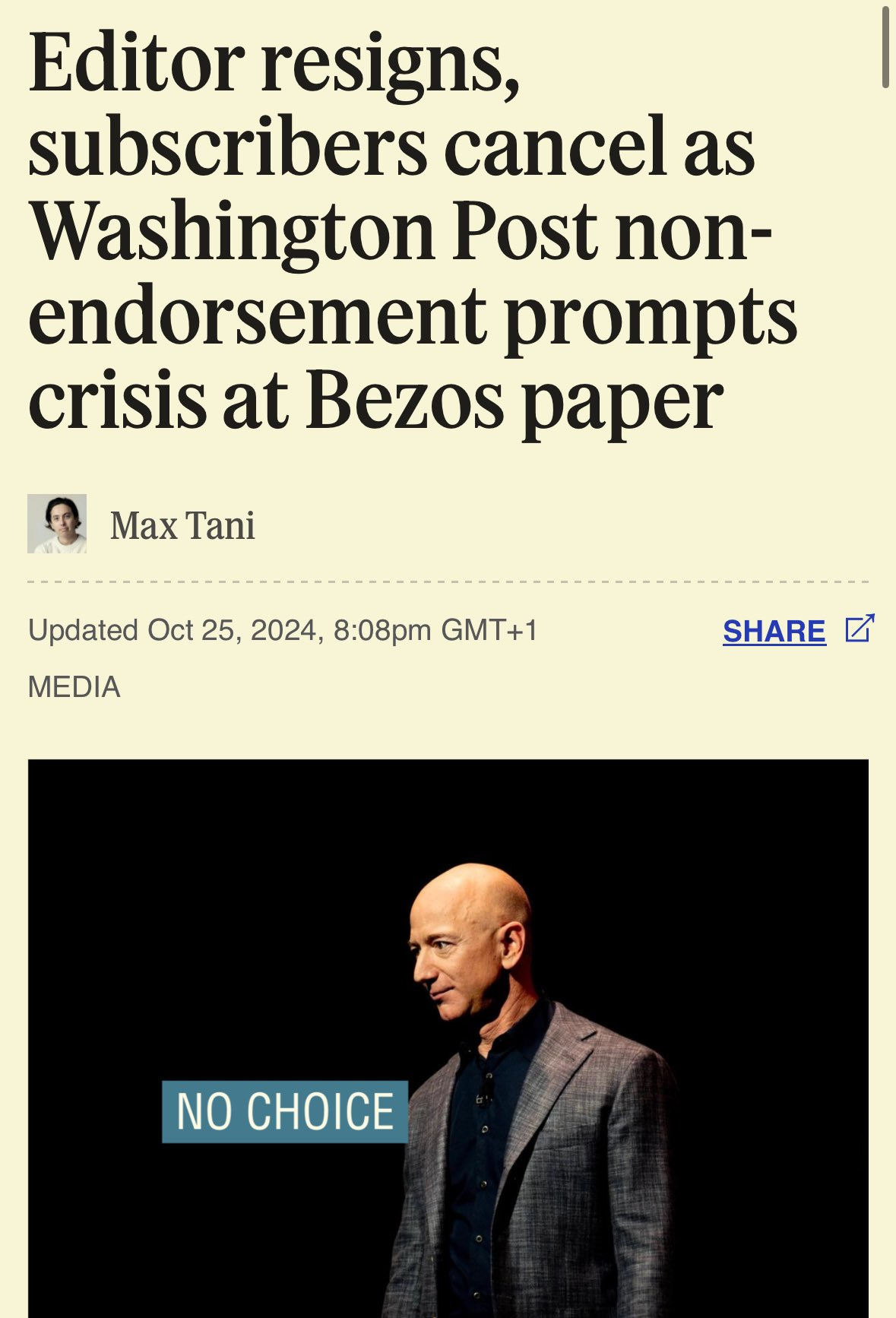Does Ruth Marcus' exit show "bounds of thinkable thought" at the Washington Post?
Or, why a good newspaper's opinion section should reflect more than the ideologies of its owner.
(A few weeks after I first posted this column, news broke that Pulitzer Prize-winning columnist Eugene Robinson decided to leave the Wash Post due to Jeff Bezos’ edicts to the opinion section. I first met Eugene many years ago when I interviewed for a job at the Post as a pop music critic and he was running the Style. section. I was impressed with him then and remain impressed with him now. But it is a sad commentary on the Post that it refers to his departure as a retirement, when he has stated clearly why he is leaving. This new regime can’t even be transparent about why a valued staffer is leaving?)
A few years ago, I was at an event in Washington D.C. hanging with some friends who are also journalists. I had just met a prominent writer who worked for the Washington Post, and when talk turned to the subjects of our work, I spoke directly about how glad I was to be in a situation where the people running my newsroom “let” me fully speak my mind in my work.
I remember the famous writer looking at me in disbelief, that I would see the situation that way. I don’t remember the exact words, but the sentiment seemed to be, if you always report the truth, the institution should and would publish it. Even then, I believed that kind of thinking was surprisingly naïve.
But now, some Washington Post columnists are finding how restrictive owner Jeff Bezos and publisher Will Lewis can be about what noted linguist and progressive scholar Noam Chomsky has called “the bounds of thinkable thought” — in this case, regarding commentary on the op-ed page.
Columnist/associate editor Ruth Marcus has quit the newspaper after 40 years. My colleague David Folkenflik reports she has accused Lewis of killing a column that criticized owner Jeff Bezos' drive to overhaul the opinion pages to focus on his libertarian priorities – including an edict that they would not print opposing views.
Folkenflik says he obtained her resignation letter, which read, in part: "Will's decision to not …run the column that I wrote respectfully dissenting from Jeff's edict - something that I have not experienced in almost two decades of column-writing - underscores that the traditional freedom of columnists to select the topics they wish to address and say what they think has been dangerously eroded.”
It seems Bezos has decided what opinions he will let writers for the Post’s op-ed sections express. And even if those decisions are limited to the pages or content sections featuring opinion, it is tough to make the case that decisions there won’t have chilling effects elsewhere in the newspaper.
As a journalist who once served on the editorial board of the Tampa Bay Times, I’m highly aware of the delicate balance newspaper opinion pages must strike between the unsigned editorials – considered to be the official opinion of the institution – opinion columns with the name of the columnist attached, like Marcus wrote for the Post, and columns commissioned from outside writers or published from wire services like the Associated Press.
Ideally, a well-crafted op-ed page gives regular readers a sense of where the newspaper’s leaders stood on issues, but also offers a wide sampling of other opinions. True enough, some ideas are beyond debate – like the notion that non-white people and woman are full citizens with the right to vote in America, for instance. But beyond such stark and basic tenets, the hope is to offer a wide range of debates and concepts, as long as they are based in provable, accurate and fair readings of facts.
Believe it or don’t, opinion writers like Marcus and me are also journalists. We have a duty to be fair and accurate – honest brokers of opinion -- even when discussing ideas with which we disagree. And so, one of our primary values is communicating the full scope of issues by featuring a wide range of opinions, even within our own pieces.
For example: It's also been my experience that newspapers are always touchy about staffers publishing work that criticizes the institution. It’s much easier to crusade for coverage that is without fear or favor when that lens is always or often pointed at issues outside the newspaper. So a column like the one Marcus referenced -- written by a staffer criticizing the owner and publisher over a controversial policy -- might have a been a tough sell at many news organizations.
But for a newspaper that lost 75,000 digital subscriptions after Bezos declared the opinion pages’ new direction (to say nothing of the more than 300,000 subscribers who canceled after Bezos pulled the paper’s planned endorsement of Kamala Harris for president), publication of a column from a 40-year veteran of the paper who disagreed with the new edicts might have gone a long way toward assuring subscribers that the Post was still committed to fairness and open-mindedness in its opinion section.
Instead, observers are left to wonder if the Post management isn’t welcoming the departure of principled voices like Marcus, in hopes of replacing them with others more in tune with the new bounds of thinkable thought.





Once again I'm confronted with a tough decision regarding the Post:
/ Cancelling my subscription in order to show my displeasure at the high-handed actions of management figures tampering with the free publication of work by their employees.
/ Or, continue to subscribe, believing the vast majority of the Post's articles and opinion pieces are thoughtful and honest.
If I cancel, then I deny a tiny bit of revenue that would go toward paying the salaries and benefits for the staff. I understand this a business owned by Bezos, so he can (and has) mess with the product as he likes. But this isn't some used-car dealership where they can roll back the odometer and then assure you the numbers showing are the truth, the whole truth and nothing but the truth.